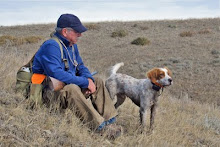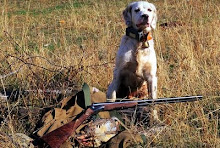I will excerpt a few comments from writings and e-mails from him.
I've had about 50 setters over the years. The best of them were neither "hard" nor "soft", and their development was based on frequent, one to one contact and interaction. Setters are known to take more time and effort to train, whether hard or soft. They seem (to me) to have more desire to get to birds than pointers do, thus are harder to steady up. The old time trainers often didn't try to put the brakes on a setter till he (or she) was 4 or 5 years old - that being said W.C. Kirk had Johnny Crockett broke as a three year old and he won a 65 dog all age stake in Oklahoma. But Kirk told me he put a tremendous amount of time in on JC. The old trainers (back in the early 1900's) would run them through several yard breaking courses, had lots of wild birds, and lots of good ground to train on.
On temperment...
You have to work setters harder and more regularly than pointers, live closer to them, and watch their behavior carefully to understand what to do. John Gardner called them "heartbreak dogs" - hard to break, but brittle cause they would cave in when you put the necessary pressure of breaking on them. That's why Elwin Smith/Harold Ray looked for dogs that would "take breaking", 'cause in field trials a great bird dog that isn't "broke" isn't worth a damn, and that describes a lot of good setter bird dogs. Where [Tekoa Mountain] Sunrise contributed a lot was that his better puppies seem to break easy enough so that they didn't have to be beat up or have a lot of pressure put on them to break out - and those are not in the majority - just look at setters in field trials - the pointers have the edge in numbers that will take breaking and often in ability as a field trial type (all age) bird dog. The best setters can compete, but frequently aren't as consistent as the best pointers - why who knows.
I also say had Commander/Wonsover bred setters for many years until I let them go on a cross country move and life change. I would take them all back right now and quit my day job, cause I've learned more about training and self control - which is the answer to a lot of it. The dogs weren't the problem, I was.
You have to work setters harder and more regularly than pointers, live closer to them, and watch their behavior carefully to understand what to do. John Gardner called them "heartbreak dogs" - hard to break, but brittle cause they would cave in when you put the necessary pressure of breaking on them. That's why Elwin Smith/Harold Ray looked for dogs that would "take breaking", 'cause in field trials a great bird dog that isn't "broke" isn't worth a damn, and that describes a lot of good setter bird dogs. Where [Tekoa Mountain] Sunrise contributed a lot was that his better puppies seem to break easy enough so that they didn't have to be beat up or have a lot of pressure put on them to break out - and those are not in the majority - just look at setters in field trials - the pointers have the edge in numbers that will take breaking and often in ability as a field trial type (all age) bird dog. The best setters can compete, but frequently aren't as consistent as the best pointers - why who knows.
I also say had Commander/Wonsover bred setters for many years until I let them go on a cross country move and life change. I would take them all back right now and quit my day job, cause I've learned more about training and self control - which is the answer to a lot of it. The dogs weren't the problem, I was.
Gun dogs and field trial dogs...
There is a big difference betweeen field trial dogs and gun dogs. Am not sure I like all the artificial judgement we use in field trials, even though I enjoy running, cause there are lots of folks now who have rarely hunted birds and just go by some "rules". It is hard to judge a bird dog well - and too many times we don't get to judge them "head to head".
There is a big difference betweeen field trial dogs and gun dogs. Am not sure I like all the artificial judgement we use in field trials, even though I enjoy running, cause there are lots of folks now who have rarely hunted birds and just go by some "rules". It is hard to judge a bird dog well - and too many times we don't get to judge them "head to head".








No comments:
Post a Comment